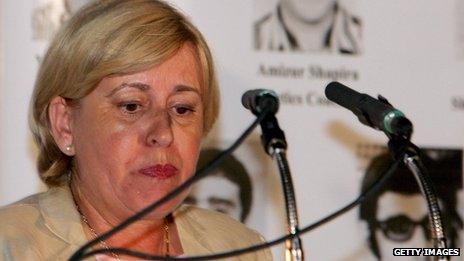London 2012: Silence for Munich Olympic victims rejected
- Published

Ankie Spitzer's husband Andre was killed in the Munich Olympic massacre
Calls for the victims of the 1972 Munich Olympics massacre to be remembered with a minute's silence at the opening of the London 2012 Games have been rebuffed by the organisers.
Ankie Spitzer has campaigned unsuccessfully for the act of remembrance since the atrocity.
Her husband - fencing coach Andre Spitzer - was one of 11 Israeli athletes and trainers killed when the Palestinian "Black September" organisation attacked apartments in the Olympic village and took them hostage in what was the darkest chapter in Olympic history.
The world looked on in horror as friendly competition was replaced by killing and bloodshed.
Many of those who died, including a West German police officer, were killed in a botched rescue effort.
Five Palestinian hostage takers were killed. Others were tracked down and subsequently killed by Israeli intelligence forces over the following years.
Mrs Spitzer told the BBC: "Our message is not one of hatred or revenge.
"It's the opposite. We want the world to remember what happened there so that this will never happen again."
Olympic ideals
Speaking from her Israeli home she said we should all vow, "that we will not bend for terrorism and that we stand for the Olympic ideal of friendship, brotherhood and peace".
A spokesman for London 2012 said in a statement that tributes would be paid to the victims at a separate ceremony at London's Guildhall in what was a joint initiative between the Israeli Embassy, the country's Olympic Committee and the Jewish Community.
It said that was "the most appropriate way to pay tribute to the athletes" at London 2012.
Games organisers Locog and the International Olympic Committee may fear provoking a walkout from some Arab countries and are keen to avoid the games being politicised.
Ankie Spitzer said the parallel Guildhall ceremony is not enough.
She rejected the idea that a minute's silence during the opening ceremony itself could be seen as a political gesture rather than an act of remembrance.
She argued that what happened was an assault on the Olympic movement itself so they should all remember the victims.
"They were not accidental tourists" she said. "They were part of the Olympic family and they should be remembered within the framework of the Olympics."
An online petition supporting her initiative has gained 83,000 signatures worldwide.
Ankie Spitzer's campaign has drawn attention to those terrible events 40 years ago but it is also a reminder of the security threats facing London 2012 and the veneer which masks the world's real conflicts when athletes take to the track.
- Published11 June 2012
- Published3 July 2010